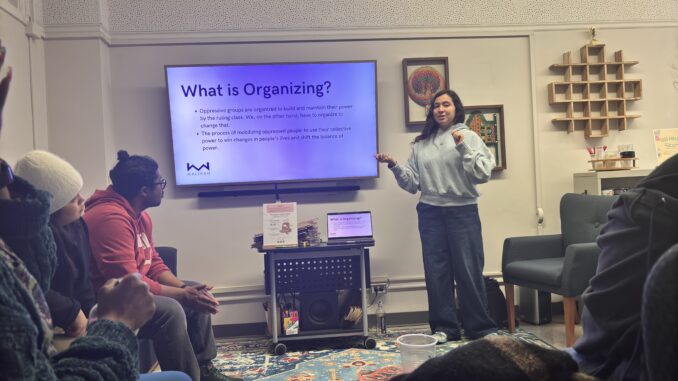
By T’Neil Gooden
“Stand up fight back!” The Brooklyn College Asian American, Native Hawaiian, and Pacific Islander (AANAPISI) Project (BCAP) hosted an activism and organizing workshop for students to learn how to become better activists, manage their own events, and how to work with other activism organizations on Dec. 5.
This event was in collaboration with two Brooklyn-based organizations currently working in activism, Malikah, which is an organization that fights against gender and hate-based violence through self-defense training, and the Vera Institute of Justice whose mission is to end the overcriminalization and mass incarceration of immigrants, people of color, and individuals who are experiencing poverty. These two organizations spoke with BC students about the impact that organizing can have on making a change.
“When we’re talking about organizing, we’re talking about how we can strategically work towards creating concrete changes materially for our communities,” Deena Hadhound, director of programs and operations at Malikah, told the audience.
Students in this workshop learned the importance of having lots of members when it comes to organizing events to provide a wide array of influence.
“Organizing involves a group of people, multiple people working together to build that power,” Hadhound said. “How can I find other people who care about that issue? Probably through talking to people, building relationships, having conversations […] So just think about how do you find those other people who care.”
Students not only learned the campaigning strategy, purpose, and research it takes to organize an event based on activism, but they also learned about the different types of organizing that can be used to share their message effectively.
“Direct service, education, advocacy, and direct action […] I kind of want to point out that all of these are really powerful forms of organizing, and oftentimes you need to use all of them together,” Hadhound told the audience.
After learning about the four types of organizing that could be used to spread information and gain attention for a certain topic–direct services, education, advocacy, and direct actions–students were provided with real world examples of how these forms of organizing were used.
An example mentioned at the event was how the Astoria Tenants Union had been fighting against the gentrification and development of the Astoria area. The organization got a group of people together to attend community meetings and civil court speaking about the harm that the development of Astoria would cause regarding the community’s rent stabilizations, displacements, and tenant power. Despite being unsuccessful in their efforts, in nonetheless solidified a united campaign.
“[Astoria Tenants Union] were unable to really get that win in their situation,” Isa Abraham, the program and partnerships coordinator for Malikah, told the audience. “But the fact that they were able to organize around this issue means that they built a base. So even if we’re doing some sort of issue-based campaign, base building and relational organizing is really important because for the next time now these relationships exist within the community.”
The voices for Malikah explained that all four types of organizing were used in the issue regarding the Astoria Tenants Union. The spokespeople of Vera contributed to the workshop by explaining the importance of research and using community engagement to make a difference in the lives of people living within these communities. Vera spoke about the importance of research within your community and how even small research projects can have a big influence.
“Research is about creating knowledge. What don’t we know and how do we create new knowledge about stuff […] Sometimes it’s just about amplifying what we already have like getting a bunch of people in a room to talk together can be a form of doing research and sharing that knowledge,” Will McKeithen, a research associate at Vera, told the audience.
As the event came to a close, Malikah’s representatives finished their workshop by explaining that while individual measures can be taken for a cause, group solidarity is needed to enact lasting change.
“[Remember] that organizing is not about you as an individual,” Hadhound said. “It’s about that relationship building, who care about the same thing as you and working together.”
Students interested in upcoming BCAP events can visit their Instagram, @bcap.brooklyn
